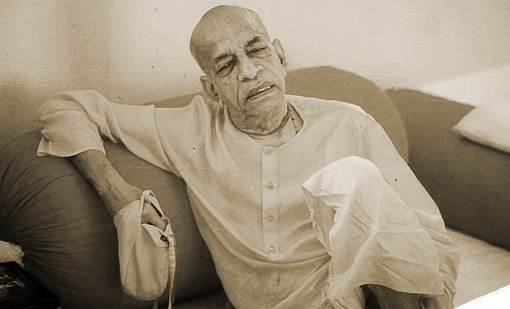
THE PRABHUPADA CONNECTION
.
A Devotee is Thoughtful
“Manīṣiṇaḥ means those who are thoughtful philosophers, those who can take up things by philosophical conclusion, that ‘I am consciousness. I am the part and parcel of the supreme consciousness. Therefore my duty is to act according to the supreme consciousness.’ Just like your hand is the part of your body. Now, it is moving according to my consciousness. The hand is not moving in its own way. As I want, that let the hand be moved, let my legs be moved, let my eye be opened and see, so I am dictating and these parts are working. Similarly we are all parts and parcel, parcel of the supreme consciousness. When we train ourself to move and act in according to that supreme consciousness, then we become transcendental to all these pious or impious activities. That is the technique.
So karma-jaṁ buddhi-yuktā hi phalaṁ tyaktvā manīṣiṇaḥ. Manīṣiṇaḥ means thoughtful, those who are thoughtful, those who have understood that ‘I am the part and parcel of the supreme consciousness and let me act in that way’… Then what will be the result? Just see the fine result: janma-bandha-vinirmuktāḥ padaṁ gacchanty anāmayam: ‘Then he becomes free from the bondage of birth and death, no more birth and death.’ Janma-bandhana. This is a, this is a very strong shackle. You see? Janma. Janma-mṛtyu-jarā-vyādhi (BG 13.9). The modern scientists, modern philosophers, they do not think about these four things, janma-mṛtyu-jarā-vyādhi, birth, death, disease and old age. They set it, set them aside. ‘Oh, let them be happy. Let us enjoy this life, hogs and dogs.’ This is human life. Human life is meant to make a solution of this bondage: life, I mean, birth, death, disease and old age. If the human civilization has not made a solution of these four things, oh, that is not human civilization. Human civilization is meant for making a complete solution of these things.
Now, take for example… Suppose you are diseased, suffering from some disease. You are lying on the bed. And you are eating in that stage, you are passing your nature’s call in that way, and taking bitter medicines, and always you have to keep by the nurses clean. Otherwise, there is some obnoxious smell. In such a condition you are lying, and some friends come to you and ask you, ‘My dear such and such, how are you today feeling?’ ‘Yes, I am today feeling well.’ What is this ‘well’? He’s lying on the bed. He’s passing his nature’s calls in that way. He’s eating bitter medicine, and he, he cannot move. All these inconveniences, and he says that ‘I am well.’ Similarly, in our material conception of life, if we think, ‘I am happy,’ that is foolishness. That is foolishness. There is no happiness in material life. It is impossible to get happiness. Then we do not know meaning of happiness. Therefore this very word is used, manīṣiṇaḥ. We want to happy, to become by some extraneous, artificial means. And how long it will stand? It will not stand. You’ll again come back. Suppose by intoxication you feel happy. Oh, that is not your actual happiness. Suppose by chloroform I am unconscious; I don’t feel the pains of operation. Oh, that does not mean that I am out of these pains and pleasures. This is artificial. So real, real pleasure, real life is here, as recommended in Bhagavad-gītā by Śrī Kṛṣṇa. Just see. Karma-jaṁ buddhi-yuktā hi phalaṁ tyaktvā manīṣiṇaḥ. Manīṣiṇaḥ means the thoughtful. ‘They give up the reaction of, of work, being situated in the platform of consciousness. And the result will be that janma-bandha-vinirmuktāḥ, this bondage of birth and death and disease and old age, he becomes free from that.’ Then the next life? Padaṁ gacchanty anāmayam. Anāmayam. Anāmayam means where there is no death, no, I mean to say, old age, no birth, no disease. That is possible. That is called Vaikuṇṭha.”
(Srila Prabhupada Lecture, San Francisco, March 25, 1967)
